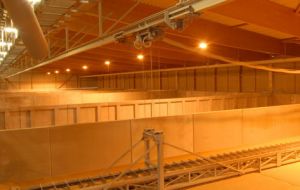MercoPress. South Atlantic News Agency
Brazil retakes wheat imports, the highest in three years
 Conab said its higher import forecast reflected unexpectedly strong wheat volumes brought in late last year, driving total purchases for calendar 2016 to 6.87m tonnes
Conab said its higher import forecast reflected unexpectedly strong wheat volumes brought in late last year, driving total purchases for calendar 2016 to 6.87m tonnes  “The supply of wheat in Mercosur will be broad, with production in Argentina expected to grow to 14.4m tonnes, supplying the market with good quality wheat”
“The supply of wheat in Mercosur will be broad, with production in Argentina expected to grow to 14.4m tonnes, supplying the market with good quality wheat” Brazilian officials ditched expectations of a tumble in wheat imports to a multi-year low after a surprisingly strong finish to 2016 for buy-ins, encouraged by a recovery in the real and state purchases of domestic supplies. Conab - which a month ago slashed its forecast for Brazil's wheat imports in 2016-17 [on an August-to-July basis] to 5.10m tonnes, the lowest since at least the mid-1990s – this week revised its forecast sharply upwards, to 5.95m tonnes.
That would represent a rise of more than 440,000 tonnes year on year, and indeed mark the highest imports in three years by Brazil which, while an exporter of the likes of coffee, sugar and soybeans, is a structural purchaser of wheat, largely of higher quality milling varieties.
The revision came despite a small upgrade, of 30,000 tonnes to a record 6.73m tonnes, in Conab's estimate for the newly-finished domestic harvest.
Instead, Conab said its higher import forecast reflected unexpectedly strong wheat volumes brought in late last year, helping drive total purchases for calendar 2016 to 6.87m tonnes, a jump of 33% year on year.
“It is worth noting the volume of wheat imported in December of 713,700 tonnes, against 464,400 tonnes in the same month of the previous year,” Conab said.
The bureau highlighted that this had come at “the time when the government intervened” in the domestic market through programmes which include a so-called PGPM scheme aimed at offering a minimum price set at R$38.65 per 60 kilogramme bag, or R$644.17 per tonne, in the southern wheat belt.
One of the aims of Brazil's wheat subsidy regime is to facilitate movement of wheat from major growing states, such as Parana and Rio Grande do Sul, in the south to demand centres further north.
Conab flagged that Brazil had imported 1.67m tonnes of Argentine wheat in the August-to-December period, along with 1.0m tonnes of US supplies. And it highlighted that Argentina, which as a fellow member of Mercosur exports wheat to Brazil duty free, remained a key source of the grain.
“The supply of wheat in Mercosur will be broad, with production in Argentina expected to grow to 14.4m tonnes, supplying the market with good quality wheat,” Conab said.
“With this, Argentina will have a surplus of 8m tonnes, requiring the continuity of a good export performance, as has already been observed recently.”




Top Comments
Disclaimer & comment rules-

Read all commentsImporting grain? alcohol? Why enough of it can't be produced in Brazil for the “EXPORTS” instead?
Jan 14th, 2017 - 09:30 am 0What kinds of scandals are underneath?
Commenting for this story is now closed.
If you have a Facebook account, become a fan and comment on our Facebook Page!